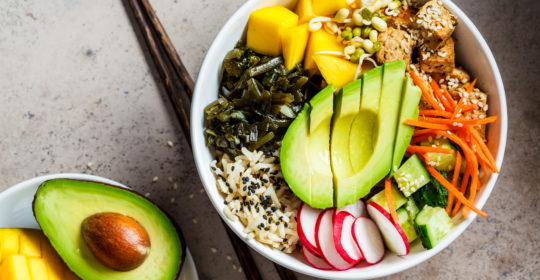
What are the pros and cons of a vegan diet for IBS?
When living with irritable bowel syndrome, or IBS, it can be a hassle determining what your body can and cannot process. And different IBS sufferers experience symptoms for different reasons. For example, many with IBS suffer flare-ups due to gluten sensitivity. So if you have IBS, especially if you happen to have other dietary allergies or restrictions, it may be best to change your diet. Some people who have IBS choose to follow a vegan diet, as it can help them live a lifestyle with little to no symptoms. But what are the positives to changing to a vegan diet if you have IBS, and are there any downsides?
What does it mean to be vegan?
Some can confuse themselves between the terms vegan and vegetarian. If you follow a vegetarian diet, you typically avoid meat, but you can eat dairy products and eggs. Following a vegan diet means that you do not eat any animal products such as meats, dairy, fish, eggs, rennet, gelatin, and other types of animal protein. Some vegans may also avoid honey, but it is up to one’s preference if they want to include it in their diet. By cutting out animal products from their diet, vegans eat a diet of fruits, vegetables, beans, nuts, and seeds. By eating plenty of plant foods, vegans are getting a wide variety of vitamins, protein, healthy fats, and minerals in their diet.
From what sources do vegans get their protein?
By following a vegan diet and not eating any meat, one must get their protein from another source. While meat products can provide a source of protein for an omnivorous diet, many plant foods can also be an excellent source of protein. Some great protein sources for those on a vegan diet are tofu, tempeh, edamame, lentils, chickpeas, peanuts, almonds, quinoa, spirulina, chia seeds, and hemp seeds. Some vegetables contain protein like kale, mushrooms, and broccoli, though not enough to be eaten alone. Nutritional yeast is also common to see in vegan dishes as a replacement for cheese. You can also use it as a condiment or a way to thicken dressings and sauces.
The positives of a vegan diet for those with IBS
When looking at FODMAPs, one can see the correlation between the positives of eating a vegan diet. FODMAPs are short-chain carbohydrates and sugar alcohols poorly digested by the body. So when one follows a low-FODMAP diet, it can alleviate problems related to IBS. Foods that are on the high-FODMAP diet include dairy, wheat products, and natural and artificial sweeteners.
While meat is on the low-FODMAP list, it is best to consider cutting it out for those with IBS. Fish and meat and red meat, in particular, are some of the most difficult foods for the body to digest. The proteins and fats these foods contain are complex molecules that take up to two days for your body to break down and digest. These can cause bloating and discomfort, which can aggravate the symptoms of IBS.
The positives of following a vegan diet when you live with IBS are getting a lot of nutrients from eating tons of plant foods and, more than likely, eating a lot of fresh foods. By eating tons of foods that fall within the superfoods category, you are intaking plenty of antioxidants and crucial vitamins and minerals to live a healthy life. A study back in 2019 showed that eating more plant-based foods and fewer animal foods lowered one’s risk of heart disease and death. A vegan diet can also reduce your risk for cancer and type two diabetes.
The downsides of a vegan diet for those with IBS
The downside of following a vegan diet if you have IBS is that a lot of food that is on the high-FODMAPs list are fruits like peaches, apples, pears, watermelon, and dried fruits. The high-FODMAPs list also includes vegetables like onions, garlic, broccoli, Brussel sprouts, and mushrooms. Not to mention beans, lentils, and nuts are also listed. So if you are following a vegan diet and have IBS, you need to be cautious about what foods can cause flare-ups. Just because a type of food is on the high-FODMAPs list does not mean you cannot eat it. If something is on the list means that it could cause a flare-up, not that it will. It’s best to go through the FODMAPs list and see what your body can eat.
The other thing to be cautious of when choosing to go vegan is that many people who follow a vegan diet do not get enough calcium, iron, and vitamin B12. Foods that are good sources of calcium, iron, and vitamin B12 are green, leafy vegetables, rice and oat drinks, dried fruits, sesame seeds, and fortified foods. However, this brings us back to square one: almost all of these foods are on the high-FODMAPs list, so those who are sensitive may not have many options to choose from on a vegan diet.
Overall verdict
Choosing to go vegan if you live with IBS is a case-by-case scenario. There is no definite answer as to if this may be the best option for you. It’s best to look at the foods that trigger your symptoms to see if following a vegan diet may be best for you. If you decide to go vegan and get concerned about not getting enough vitamins and minerals, you can always take a dietary supplement. Just keep in mind that the real thing is better than a supplement. If you are unsure, you can always consult with your doctor to see which options are best for you.
Leave a reply →